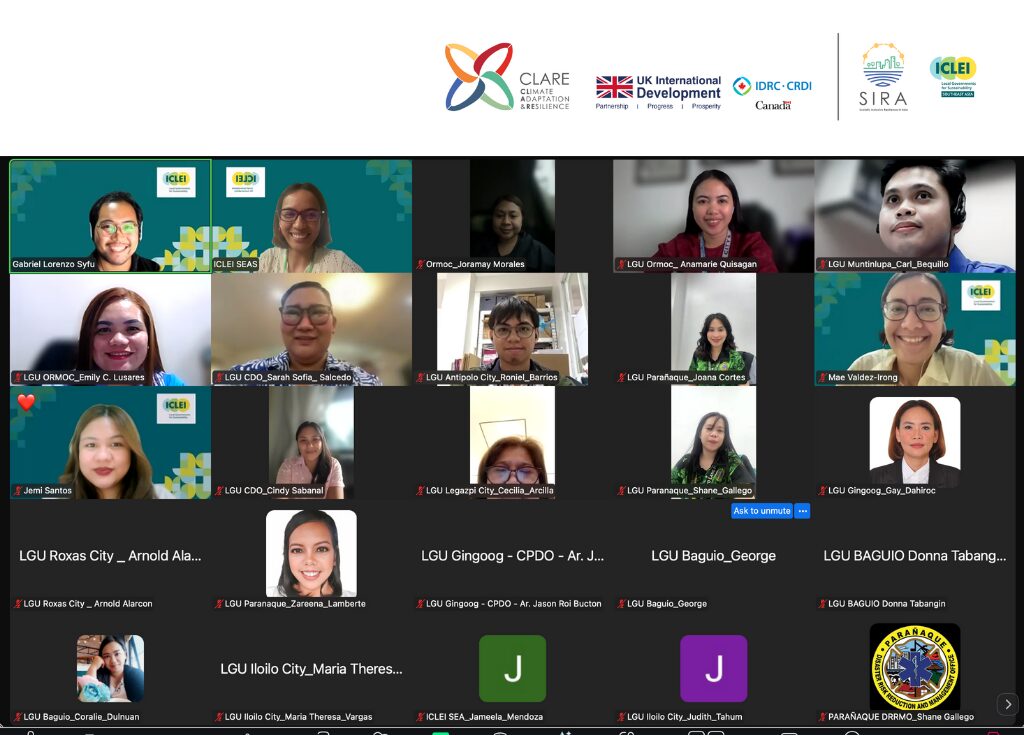Local governments in the Philippines begin leadership training in socially inclusive resilience
/

Fellows of the Socially Inclusive Resilience Leadership Program in the Philippines under the Enhancing Local Capacities for Socially Inclusive Resilience in Asia (SIRA) Project attend an orientation meeting about the program with ICLEI – Local Governments for Sustainability Southeast Asia (SEA) last August 28, 2025 via Zoom.
The Enhancing Local Capacities for Socially Inclusive Resilience in Asia (SIRA) Project officially began the Socially Inclusive Resilience Leadership Program in the Philippines in an orientation meeting with participating local government units (LGUs) last August 28, 2025 via Zoom.
The participating Philippine LGUs committed to being part of the SIRA Project by nominating at most LGU personnel to participate as fellows of the Socially Inclusive Resilience Leadership Program.
ICLEI – Local Governments for Sustainability Southeast Asia (SEA) gathered fellows— composed mostly of women involved in their respective cities’ resilience and disaster risk reduction and management thrusts—from cities all over the Philippines in the meeting to provide an overview of the program, set expectations, and give fellows a chance to meet each other and introduce themselves.

Implemented under the SIRA Project, the program aims to strengthen the technical capacity of local governments and climate practitioners to effectively engage with different stakeholders (including women, urban poor communities, children, persons with disability, LGBTQIA+ communities, indigenous communities, tribal populations, and others) in order to develop and implement climate resilient actions that are inclusive and contribute to holistic and sustainable urban development.
The hybrid program, which will run for six months, consists of weekly synchronous and asynchronous learning sessions and collaborative activities to co-develop measures that will integrate and mainstream social inclusion and resilience in local plans and programs.
Learning sessions are based on modules on the following topics: Socially inclusive resilience building at the local level; Integrating gender and inclusion in local development strategies; Building resilience through nature-based solutions; and Financing socially inclusive resilience at the local level.
In the Philippines, the program fellows are also expected to complete a capstone project concept on socially inclusive resilience, facilitate an inclusive governance process in the form of a Town Hall COP (Conference of Parties), participate in peer exchanges and an in-person national conference in 2026.

18 LGUs around the Philippines representing the three major island groups of Luzon, Visayas, and Mindanao have expressed their interest in participating in the SIRA Project’s Socially Inclusive Resilience Leadership Program.
Funded by UK Aid through the Foreign Commonwealth and Development Office (FCDO) and the International Development Research Centre, Canada through the Climate Adaptation and Resilience (CLARE) programme and under the implementation of the ICLEI SEA and South Asia Secretariats, the SIRA Project aims to identify and address the immediate capacity needs of local governments in pursuing climate action that is inclusive and sustainable through a systematic and phased capacity strengthening programme anchored on South-South cooperation among four Asian countries: Bangladesh, Indonesia, Nepal, and the Philippines.
The SIRA Project was launched in the Philippines in September 2024.

This news article was written by Jameela Antoniette Mendoza, ICLEI Southeast Asia Communications Assistant.
Categories
Countries
CLARE Pillars
CLARE Themes
CLARE Topics
Published
CLARE Projects
CLARE Partners

